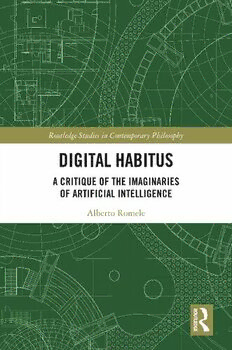Download Digital Habitus: A Critique of the Imaginaries of Artificial Intelligence PDF Free - Full Version
Download Digital Habitus: A Critique of the Imaginaries of Artificial Intelligence by Alberto Romele in PDF format completely FREE. No registration required, no payment needed. Get instant access to this valuable resource on PDFdrive.to!
About Digital Habitus: A Critique of the Imaginaries of Artificial Intelligence
This book proposes a new theoretical framework for approaching the causes and effects that digital technologies and the imaginaries related to them have on the processes of self-interpretation and subjectivation. It formulates three main theses. First, it argues that today’s digital technologies, which are primarily based on artificial intelligence (AI) algorithms and big data are formidable habitus machines: they offer increasingly personalized services, but these machines are actually indifferent to individuals and their personalities. Second, this book contends that the effectiveness of these machines does not depend solely on their concrete capacity to classify the social world. It also depends on the expectations, hopes, fears, and imaginaries that we have concerning these technologies and their capacities. This cultural habitus―a worldview, or world picture―leads us to believe in the concrete effectiveness of AI and its potential for our societies. Third, the author takes this Bourdieusian notion of habitus and connects it to current “empirical turn” in philosophy of technology. He contends that, by looking too closely at the things themselves, many philosophers of technology have deprived themselves of the possibility to study the symbolic conditions of possibility in which single technological artifacts are always embedded. Digital Habitus will appeal to scholars and students working in philosophy of technology, the ethics of artificial intelligence, media studies, and science and technology studies.
Detailed Information
| Author: | Alberto Romele |
|---|---|
| Publication Year: | 2023 |
| ISBN: | 9781032509648 |
| Pages: | 185 |
| Language: | English |
| File Size: | 8.475 |
| Format: | |
| Price: | FREE |
Safe & Secure Download - No registration required
Why Choose PDFdrive for Your Free Digital Habitus: A Critique of the Imaginaries of Artificial Intelligence Download?
- 100% Free: No hidden fees or subscriptions required for one book every day.
- No Registration: Immediate access is available without creating accounts for one book every day.
- Safe and Secure: Clean downloads without malware or viruses
- Multiple Formats: PDF, MOBI, Mpub,... optimized for all devices
- Educational Resource: Supporting knowledge sharing and learning
Frequently Asked Questions
Is it really free to download Digital Habitus: A Critique of the Imaginaries of Artificial Intelligence PDF?
Yes, on https://PDFdrive.to you can download Digital Habitus: A Critique of the Imaginaries of Artificial Intelligence by Alberto Romele completely free. We don't require any payment, subscription, or registration to access this PDF file. For 3 books every day.
How can I read Digital Habitus: A Critique of the Imaginaries of Artificial Intelligence on my mobile device?
After downloading Digital Habitus: A Critique of the Imaginaries of Artificial Intelligence PDF, you can open it with any PDF reader app on your phone or tablet. We recommend using Adobe Acrobat Reader, Apple Books, or Google Play Books for the best reading experience.
Is this the full version of Digital Habitus: A Critique of the Imaginaries of Artificial Intelligence?
Yes, this is the complete PDF version of Digital Habitus: A Critique of the Imaginaries of Artificial Intelligence by Alberto Romele. You will be able to read the entire content as in the printed version without missing any pages.
Is it legal to download Digital Habitus: A Critique of the Imaginaries of Artificial Intelligence PDF for free?
https://PDFdrive.to provides links to free educational resources available online. We do not store any files on our servers. Please be aware of copyright laws in your country before downloading.
The materials shared are intended for research, educational, and personal use in accordance with fair use principles.

